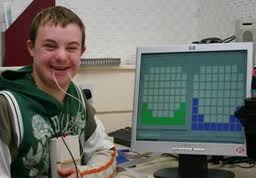An “Old” Technique Finds New Purpose.
 Trisomy occurs when chromosome pairs fail to separate properly during meiosis, and a second copy of one of the chromosomes forms. Autosomal trisomies, identified by affected chromosomal number, result in varying degrees of congenital malformations, organ defects and developmental disabilities. The three most common autosomal trisomies surviving to birth are: Patau syndrome (Trisomy 13), Edward syndrome (Trisomy 18) and Down syndrome (Trisomy 21). These occur at a rate of 1:10,000; 1:7,000 and 1:800-1,000 live births, respectively. Hearing loss, speech apraxia, vision difficulties, feeding disorders and mental incapacities are common manifestations of autosomal trisomies, greatly impacting communication skills.
Trisomy occurs when chromosome pairs fail to separate properly during meiosis, and a second copy of one of the chromosomes forms. Autosomal trisomies, identified by affected chromosomal number, result in varying degrees of congenital malformations, organ defects and developmental disabilities. The three most common autosomal trisomies surviving to birth are: Patau syndrome (Trisomy 13), Edward syndrome (Trisomy 18) and Down syndrome (Trisomy 21). These occur at a rate of 1:10,000; 1:7,000 and 1:800-1,000 live births, respectively. Hearing loss, speech apraxia, vision difficulties, feeding disorders and mental incapacities are common manifestations of autosomal trisomies, greatly impacting communication skills.
In conjunction with Trisomy Awareness Month, The Children’s Hospital of Philadelphia is holding its annual symposium on Trisomy 21 Disorder, March 16th. A major focus will be methodologies and techniques for improving communication in Down syndrome (Ds) children, teens and young adults. Hearing impairment is a common denominator of this disorder, therefore conventional therapies using auditory feedback are not always effective. A new study at Queen Margaret University, Edinburgh, Scotland suggests that electropalatography (EPG) may correct speech problems in children with decreased intelligibility. Custom made artificial palates record tongue to palate contact, while normal articulation patterns are displayed on a computer screen. The Ds child then tries to replicate those patterns. EPG works particularly well in these cases, since the visual processing abilities of Ds children are relatively strong.
Further longitudinal studies will determine the long-term efficacy of this particular therapy, but speech language professionals may want to consider adding this to their therapeutic arsenal. Equipment leasing plans are enabling more SLP practices and clinicians to incorporate the methodology. Are you an SLP working with Down Syndrome clients looking for new challenges? Interested in a career in this field? Contact Centra at 800 535 0076 and let help you achieve your goals.